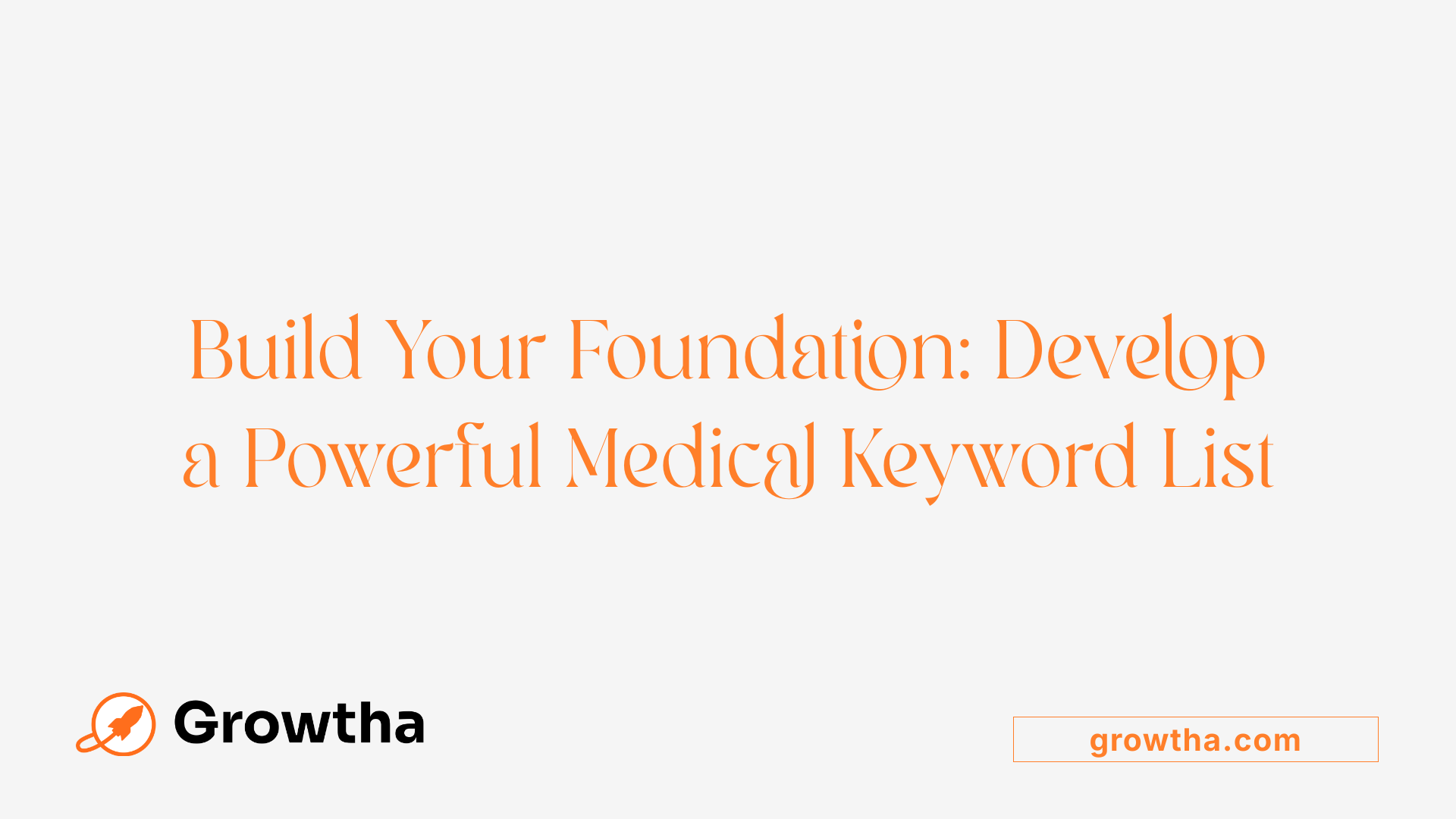How to Use Keyword Tools for Medical SEO
Mastering Keyword Strategies to Elevate Your Healthcare SEO


How to Use Keyword Tools for Medical SEO
Unlocking the Power of Keyword Tools for Medical Websites
In the competitive landscape of healthcare, visibility is vital. Effective use of keyword tools can significantly enhance your medical SEO efforts, helping your practice attract more local patients and establish authority in your niche. This comprehensive guide explores best practices, tools, and strategies for leveraging keywords to optimize your healthcare website and improve search engine rankings.
The Foundation of Medical SEO: Creating a Robust Keyword List

What are the benefits of creating a strong keyword list for medical SEO?
Creating a strong keyword list is fundamental to effective healthcare SEO. It helps search engines understand and match your website content with what potential patients are searching for, increasing your visibility in search results. By focusing on relevant terms, your site attracts targeted traffic, which means visitors are more likely to need your services.
Developing a well-researched list of keywords also demonstrates your expertise, helping build trust and credibility with both search engines and patients. When your website contains accurate, relevant keywords in places like your homepage, about page, services, and blogs, it signals relevance, making it easier for prospective patients to find you.
To build this list, it’s important to include various types of keywords—short-tail, long-tail, local, and seasonal—that reflect patient queries. Using tools such as Google Keyword Planner, SEMrush, or Ahrefs can help identify high-volume, manageable competition keywords. Incorporating trending health topics and location-specific terms ensures your practice appears in current and local search results.
Ongoing keyword research and analysis allow you to refine your list, stay competitive, and keep your content aligned with patient needs. This strategic approach ultimately results in better search rankings, higher website traffic, and more patient inquiries, establishing your healthcare practice as a trusted authority in your community.
Strategic Keyword Incorporation Across Your Healthcare Website

Where should keywords be incorporated on a healthcare website for optimal SEO?
Effective healthcare SEO hinges on placing relevant keywords thoughtfully across your website. These keywords should appear naturally in key areas such as the domain name, page titles, URLs, and meta descriptions. This helps search engines quickly understand the page's focus.
Headings, subheadings, and the main body content are also vital spots for keyword integration, making sure these terms align with patient search queries. Moreover, incorporating keywords into image alt text and filenames enhances accessibility and provides additional context to search engines.
Internal links using anchor text with targeted keywords help distribute page authority and improve site navigation. A balanced mix of short-tail and long-tail keywords, based on detailed research, can attract a broader audience.
Regular performance monitoring and making adjustments based on analytics tools like Google Search Console ensure that your keyword strategy remains effective and relevant over time.
Choosing the Right Keyword Research Tools for Healthcare SEO
When developing an effective healthcare SEO strategy, selecting the appropriate keyword research tools is vital. These tools help identify relevant search terms, analyze competition, and understand patient inquiries.
Some of the most popular and recommended options include Google Keyword Planner, SEMrush, Ahrefs, Moz Pro, KWFinder, and Answer the Public. Each offers unique features tailored to healthcare SEO needs.
Google Keyword Planner is a free tool integrated with Google Ads. It provides data on search volume, competition level, and related keywords, making it a foundational resource for basic keyword analysis.
SEMrush and Ahrefs are comprehensive paid tools ideal for in-depth keyword research. They offer extensive keyword suggestions, search volume data, keyword difficulty scores, and competitive insights. These features help healthcare practices identify strategic keywords that balance relevance and ranking potential.
Moz Pro and KWFinder are also valuable, particularly in analyzing local SEO keywords and long-tail phrases relevant to healthcare services. They provide user-friendly interfaces and detailed metrics to refine keyword choices.
Answer the Public excels in uncovering question-based keywords—phrases frequently searched customers ask online. This is especially useful for creating content that directly addresses patient concerns.
Analyzing search volume and competition is essential. High-volume keywords suggest high interest, but may be more competitive. Combining this with low-to-moderate competition keywords improves chances of ranking well.
In addition to third-party tools, cross-referencing keyword ideas with first-party data sources like Google Search Console and Google Analytics provides insights into which existing keywords are already driving traffic. This data helps refine and prioritize new keywords based on real user behavior.
For example, regularly reviewing the performance of current keywords and comparing their ranking changes over time can spotlight opportunities to optimize content or focus on emerging search trends.
In summary, the combination of advanced research tools and real-world data enhances the precision of your keyword strategy, leading to better search rankings, increased relevant traffic, and higher patient engagement.
Harnessing Keyword Data for Content Planning and Optimization
How can content planning and optimization benefit from medical keyword data?
Utilizing medical keyword data is fundamental for effective healthcare content strategy. It provides insights into what patients are searching for, which questions they have, and what terms they use. This allows healthcare providers to craft content that directly addresses patient needs, boosting relevance and engagement.
By analyzing search volume, long-tail phrases, and local keywords with tools like Google Keyword Planner, SEMrush, or Ahrefs, practitioners can identify high-value topics. Incorporating these keywords seamlessly into website elements—titles, headers, meta descriptions, and the main content—helps improve search engine rankings and attracts targeted traffic.
Understanding competitor keyword strategies also highlights content gaps. For example, a practice may notice a lack of detailed articles on specific ailments or preventive care topics, presenting an opportunity to fill those gaps and stand out.
Continual monitoring with analytics tools like Google Search Console or Google Analytics enables ongoing refinement. Adjusting content based on keyword performance and search trends keeps the site competitive.
Overall, leveraging medical keyword data makes content more discoverable, relevant, and helpful to patients. This strategic approach builds authority, enhances user experience, and ultimately increases organic traffic and patient inquiries.
Maximizing Search Rankings with Keyword Strategies
What is the role of keyword tools in improving search engine rankings for healthcare websites?
Keyword tools are essential assets in healthcare SEO, helping to craft targeted and relevant content that attracts the right audience. These tools assist in identifying high-volume keywords that patients are actively searching for, such as specific medical conditions, treatments, or local health services.
Using tools like Google Keyword Planner, SEMrush, Ahrefs, or Moz, medical practices can discover long-tail phrases—more specific keyword combinations—that have less competition but high intent. This targeted approach increases the chances of ranking higher in search results and reaching potential patients in local areas.
Moreover, keyword tools provide insights into competitors’ keyword strategies and backlink profiles. This competitive analysis reveals gaps and opportunities, guiding healthcare providers in refining their content and backlink strategies.
Properly optimized titles, headers, meta descriptions, and website content all benefit from data-driven keyword selection, which makes websites more discoverable and trustworthy in the eyes of search engines. Ultimately, leveraging these tools ensures healthcare websites are aligned with patient search behaviors, boosting visibility, attracting local traffic, and enhancing authority—all critical for a successful SEO strategy.
Leveraging Local SEO for Better Community Reach

Locating local keywords
For healthcare practices, understanding the language and expressions used by the local community is crucial. By conducting local keyword research, providers can identify terms that potential patients use when searching for nearby services. Examples include phrases like 'dermatologist near me' or 'Dallas dermatologist.' Tools like KW Finder and Moz can aid in analyzing and refining these keywords. Incorporating neighborhood names, landmarks, or city-specific terms into website content ensures higher relevance in local searches.
Optimizing Google Business Profile
Claiming and verifying your Google Business Profile (GBP) is essential for local SEO success. Ensure that all information, including NAP (Name, Address, Phone number), is accurate and consistent across your website and directories. High-quality images, detailed descriptions, and updated service information enhance profile visibility. Positive reviews greatly influence local search rankings and build trust with prospective patients.
Creating local content and citations
Developing community-focused content, such as articles about local health concerns or community events, can engage your target audience. Creating local citations on reputable directories and healthcare listings reinforces your practice’s presence. This includes adding your practice to health-related directories, local chambers of commerce, and community websites.
Encouraging patient reviews
Patient reviews are a cornerstone of local SEO. Encourage satisfied patients to share their experiences on your Google Business Profile and other review sites. Responding to reviews demonstrates engagement and professionalism. Consistent, positive feedback improves your practice’s reputation and boosts rankings in local search results.
How does understanding patient search behavior help with medical SEO?
Understanding patient search behavior is vital for developing targeted SEO strategies that align with the specific keywords, topics, and questions patients are actively seeking. By analyzing search patterns, healthcare providers can create highly relevant content, improve keyword rankings, and enhance user experience, leading to increased visibility and trustworthiness. Incorporating voice search optimization, local SEO, and technical best practices ensures that the practice appears prominently in search results across devices. Additionally, monitoring performance metrics and managing online reputation reinforce credibility and attract more relevant patient traffic. Overall, understanding patient search behavior enables healthcare providers to stay responsive to evolving trends and effectively connect with their community.
The Importance of Quality Content and User Engagement
Creating compelling and accurate content is essential for healthcare SEO success. Developing provider-focused materials that reflect current medical standards and scientific evidence builds trust with patients and search engines alike.
Use multimedia assets like videos, images, and infographics to make the content more engaging. Videos explaining procedures or common health questions can increase site dwell time and improve rankings. Properly optimized images with descriptive alt texts also enhance accessibility and SEO.
Implementing schema markup, a type of structured data, helps search engines better understand your website’s content. This can improve indexation and enable rich results, such as star ratings or FAQ snippets, making your practice more visible.
Encouraging patients to leave reviews and managing your online reputation is crucial. Positive reviews boost local SEO rankings and influence prospective patients’ decisions. Actively responding to reviews and engaging with patient feedback demonstrates care and transparency.
What are best practices for medical keyword research and selection?
Best practices for medical keyword research and selection involve identifying relevant, highly searched terms that prospective patients use, including local, procedure, disease, and long-tail keywords. Utilizing keyword research tools such as Google Keyword Planner, SEMrush, or Ahrefs helps uncover high-potential keywords with manageable competition, especially those with local intent like “near me” searches. Incorporating these keywords thoughtfully into website content, blog posts, and service pages enhances relevance without keyword stuffing, improving search rankings and visibility. Prioritizing keywords based on clear search intent—whether informational, navigational, commercial, or transactional—ensures content aligns with user needs. Regularly updating your keyword strategy based on search trends and performance data is vital to maintain and improve online presence in the healthcare niche.
Technical SEO and Website Optimization Tactics

What are the technical SEO components essential for healthcare websites?
For healthcare websites, technical SEO forms the backbone of effective search visibility and user experience. Crucial elements include implementing schema markup, a form of structured data that helps search engines understand the content's medical context, provider details, and procedural information. This enhances visibility through rich snippets in search results.
Website speed is another vital aspect; fast-loading pages reduce bounce rates and improve patient engagement. Optimizing images, leveraging browser caching, and minimizing code help reach ideal page load times.
Mobile responsiveness is non-negotiable, considering the rise of mobile device usage among patients seeking healthcare information. A mobile-friendly design ensures accessible, easy-to-navigate content across all devices.
Developing an XML sitemap facilitates better site crawling by clearly listing all important pages, while properly configuring robots.txt files directs search engines on which pages to index or avoid.
An organized URL structure, comprising descriptive and keyword-rich URLs, supports easy navigation and better indexing.
Effective navigation and a logical site architecture enhance user experience, guiding visitors seamlessly to relevant information and improving overall site authority. In sum, these technical SEO tactics ensure that healthcare websites are optimized for search engines and user accessibility, ultimately translating into higher rankings and more patient inquiries.
Monitoring Performance and Staying Ahead in Healthcare SEO

How does understanding patient search behavior help with medical SEO?
Knowing what patients are searching for allows healthcare providers to tailor their SEO strategies effectively. By analyzing search behavior, such as common questions, keywords, and trending topics, practices can create content that directly addresses patient needs. This targeted approach increases their chances of ranking higher in search results.
Monitoring search trends helps in choosing relevant keywords, especially long-tail phrases that show clear intent. This improves both visibility and credibility, as patients find trustworthy, accurate information quickly.
Tools like Google Search Console and Analytics provide insights into which keywords attract the most traffic, how visitors behave on the site, and what questions patients are asking. This data helps in refining keywords, updating content, and optimizing web pages.
Adjusting strategies based on concrete data ensures healthcare practices stay competitive and responsive. They can optimize existing content, identify new keyword opportunities, and improve page engagement.
Furthermore, staying updated with search trends, such as voice search and local searches, ensures the practice remains highly visible to the community.
Lastly, understanding patient search behavior supports reputation management and enhances the overall user experience, fostering trust and long-term relationships with patients.
Tracking tools and strategies for performance evaluation
Healthcare SEO success relies on tools like Google Search Console, Google Analytics, SEMrush, and Ahrefs. These platforms help track keyword rankings, organic traffic, bounce rates, and other vital metrics.
Regular data review reveals which pages perform best and highlights areas needing improvement. For example, if a particular keyword drops in rankings, strategies can be adjusted promptly.
Strategies include updating meta tags, refining content, and seeking backlinks from authoritative sources. These efforts should be ongoing to maintain and enhance search performance.
Staying current with trends and regulations
Search trends evolve with technology and patient behavior. For example, voice search is becoming more popular, shifting keyword strategies to focus on natural language phrases.
Healthcare providers must also stay compliant with regulations like HIPAA while optimizing online content and managing online reputation.
Participating in continuous education about changes in search engine algorithms and search behaviors is crucial. Regularly reviewing industry updates, attending webinars, and engaging with SEO communities ensures strategies remain effective.
By combining data-driven insights with knowledge of current trends and regulations, healthcare practices can sustain strong online presence, attract more patients, and provide timely, relevant information.
Harnessing Keywords for Long-term Healthcare SEO Success
In conclusion, utilizing keyword tools effectively is a cornerstone of successful healthcare SEO. By conducting thorough research, strategic implementation, and continuous monitoring, medical practices can significantly improve their search engine rankings, increase local visibility, and attract highly targeted patient inquiries. Staying abreast of emerging trends and updates in keyword strategies will ensure your healthcare website remains competitive and authoritative. Remember, well-optimized content paired with technical excellence and local SEO efforts multiplies the benefits, ultimately fostering trust and growth within your community.
References
- Healthcare Keywords to Include in Your Website's Healthcare SEO
- How to Conduct Keyword Research for Local Medical SEO
- Healthcare SEO: Complete Industry Guide for 2025
- How Do You Choose the Right Keywords for SEO in Healthcare?
- Medical SEO Guide: Strategies for Effective Healthcare SEO
- Why a Local Keyword Strategy is Important for Healthcare Practices
- Leveraging Healthcare SEO for your Medical Practice







